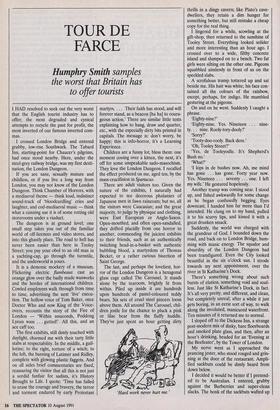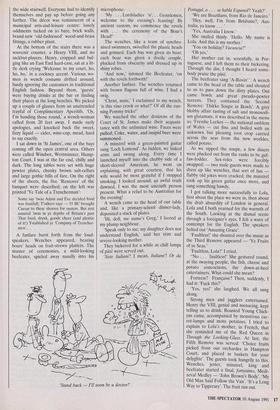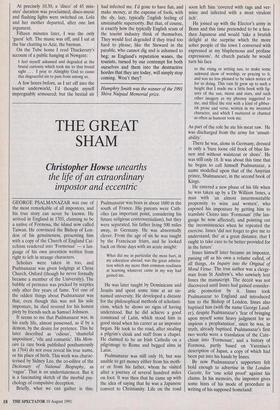TOUR DE FARCE
Humphry Smith samples
the worst that Britain has to offer tourists
I HAD resolved to seek out the very worst that the English tourist industry has to offer; the most degraded and cynical attempts to recycle the past for profit, the most inverted of our famous inverted com- mas.
I crossed London Bridge and entered grubby, low-rise Southwark. The Tabard Inn, starting-point for Chaucer's pilgrims, had once stood nearby. Here, under the steel-grey railway bridge, was my first desti- nation, the London Dungeon.
If you are sane, sexually mature and childless, or if you live a long way from London, you may not know of the London Dungeon. Think Chamber of Horrors, with a mediaeval theme — think loud, indistinct sound-track of 'bloodcurdling' cries and laughter, and cod-mediaeval music — think what a cunning use it is of some rotting old storerooms under a viaduct.
The dungeon is at ground level; one small step takes you out of the familiar world of off-licences and video stores, and into this ghastly place. The road to hell has never been easier than here in Tooley Street; you pay your obol to an old man in a yachting-cap, go through the turnstile, and the underworld is yours.
It is a demonic mockery of a museum. Flickering electric flambeaux cast an orange glow over the badly made waxworks and the hordes of international children. Cowled employees walk through from time to time, advertising the next 'live' execu- tion. The hollow voice of Tom Baker, once Doctor Who and now King of the Voice- overs, recounts the story of the Fire of London — 'Within sssuconds, Poddong Lyeun wass . . gutted!'. All this, and an ace caff too.
The first exhibits, still dimly touched with daylight, charmed me with their tarty little stabs at respectability. In the middle, a guil- lotine; to the right, torture of a witch; to the left, the burning of Latimer and Ridley, complete with glowing plastic faggots. And on all sides brief commentaries are fixed, reassuring the visitor that all this is not just a sordid funfair for sadists, it's History Brought to Life. I quote: 'Time has failed to erase the courage and bravery, the terror and torment endured by early Protestant martyrs. . . Their faith has stood, and will forever stand, as a beacon [ha ha] to coura- geous action.' There are similar little texts explaining how to hang, draw and quarter, etc., with the especially dirty bits printed in capitals. The message is: don't worry, be happy; this is info-horror, it's a Learning Experience.
Children are a funny lot, bless them: one moment cooing over a kitten, the next, it's off for some unspeakable sado-masochism. They love the London Dungeon. I recalled the effect produced on me, aged ten, by the mass-crucifixion in Spartacus.
There are adult visitors too. Given the nature of the exhibits, I naturally had expected to see decorous phalanxes of Japanese men in fawn raincoats; but no, all the visitors were Caucasian; and the great majority, to judge by physique and clothing, were East European or Anglo-Saxon. Open-mouthed, and often open-sandalled, they drifted placidly from one horror to another, commending the juiciest exhibits to their friends, such as an authentically twitching head-in-a-basket with authentic bubbling blood, a martyrdom of Thomas Becket, or a rather curious bisection of Saint George.
The last, and perhaps the loveliest, hor- ror of the London Dungeon is a hexagonal glass cage called The Carousel. It stands alone by the tearoom, brightly lit from within. Piled up inside it are hundreds upon hundreds of pastel-coloured teddy bears. Six sets of cruel steel pincers loom above them. All around The Carousel, chil- dren jostle for the chance to pluck a pink or lilac bear from the fluffy huddle. They've just spent an hour getting dirty `Hard work never hurt me.' thrills in a dingy cavern; like Plato's cave- dwellers, they retain a dim hunger for something better, but still mistake a cheap copy for the real thing.
I lingered for a while, scowling at the gift-shop, then returned to the sunshine of Tooley Street. Everything looked solider and more interesting than an hour ago. I crossed over to a wide, filthy concrete island and slumped on to a bench. Two fat girls were sitting on the other one. Pigeons squabbled aimlessly in front of us on the speckled slabs.
A scrofulous tramp tottered up and sat beside me. His hair was white; his face con- tained all the colours of the rainbow, except, perhaps, for indigo. He mumbled gesturing at the pigeons.
On and on he went. Suddenly I caught a phrase.
!Eighty-nine?'
`Eighty-nine. Yes. Nineteen . . . nine- ty. . . nine. Rooly-tory-dooly?'
`Sorry?'
`Tooty-doo-rooly. Back dere.'
`Oh, Tooley Street?'
`Yes, de Tooleyodle. It's Shepherd's Bush no.'
`What?'
`I kips in de bushes now. Ah, me mind has gone . . . has gone. Forty year now. Yes. Nineteen . . . seventy . . . one. I left my wife.' He gestured hopelessly.
Another tramp was coming near. I stood up, and fished awkwardly for some change as he began confusedly begging. Eyes downcast, I handed him far more than I'd intended. He clung on to my hand, pulled it to his scurvy lips, and kissed it with a great drunken smack.
Suddenly, the world was charged with the grandeur of God. I bounded down the road, and back on to London Bridge, hum- ming with manic energy. The squalor and absurdity of the London Dungeon had been transfigured. Even the City looked beautiful in the six o'clock sun. I strode towards my next appointment, over the river in St Katharine's Dock.
There's something wrong about such bursts of elation, something void and soul- less. Just like St Katharine's Dock, in fact. It's all very pretty, and different, and clean, but completely unreal; after a while it just gets boring, in an eerie sort of way, to walk along the involuted, manicured waterfront. Ten minutes of it returned me to normal.
I sloped off to the Dickens Inn, a strange post-modern mix of dinky, bare floorboards and smoked plate glass, and then, after an hour's drinking, headed for an 'Evening at the Beefeater', by the Tower of London.
My nerve went as I approached the prancing jester, who stood rouged and grin- ning at the door of the restaurant. Ampli- fied sackbuts could be dimly heard from down below.
I decided it would be better if I pretend- ed to be Australian. I entered, grubby against the Burberries and super-clean slacks. The honk of the sackbuts wafted up the wide stairwell. Everyone had to identify themselves and pay up before going any further. The decor was reminiscent of a municipal arts-and-leisure centre: lonely oddments tacked on to bare, brick walls, brand-new 'old-fashioned' wood-and-brass fittings, a rubber plant.
At the bottom of the stairs there was a souvenir counter, a Henry VIII, and no sackbut-players. Henry, cropped and bul- ging like an East End hard-case, sat at a lit- tle desk crying 'Welcome to my court, ho, ho, ho,' in a cockney accent. Various wo- men in wench costume drifted around, busily ignoring the customers in traditional English fashion. Beyond them, 'guests' were buying drinks at the bar or finding their places at the long benches. We picked up a couple of glasses from an unattended trayful of Complimentary Aperitifs. `0y, I'm handing those round,' a wench-woman called from 20 feet away. 1 made surly apologies, and knocked back the sweet, fizzy liquid — cider, wine-cup, mead, hard to say exactly.
I sat down in `St James', one of the bays coming off the open central area. Others were called Windsor, Westminster, Hamp- ton Court. I was at the far end, chilly and dark. The long tables were set with huge pewter plates, chunky brown salt-cellars and large gothic bills of fare. On the right of the sheets, the five 'Removes' of the banquet were described; on the left was printed `Ye Tale of a Trencherman':
Some say 'twas Adam and Eve decided food was fruitfull; T'others saye — 55 BC brought Caesar to these shorres for oysters. But rest assured 'twas in ye depths of Britain's past That food, drynk, goode cheer (and plentie of it!) Ystablished ye 'Company of Trencher- men'..
A fanfare burst forth from the loud- speakers. Wenches appeared, bearing boars' heads on fruit-strewn platters. The master of ceremonies, a mild-looking beefeater, spieled away nasally into his microphone: `My . . Lordsladies `n'... Gennlemen, welcome to the evening's feasting! By ancient custom, we commence the revels with . . . the ceremony of the Boar's Head!'
The wenches, like a team of synchro- nised swimmers, swivelled the plastic heads and grinned. Each bay was given its boar; each boar was given a docile couple, plucked from obscurity and dressed up in shiny robes.
`And now,' intoned the Beefeater, 'on with the revels forthwith!'
Another fanfare. The wenches returned with brown flagons full of wine. I had a swig.
`Christ, mate,' I exclaimed to my wench, is this vino crook or what?' Of all the cun- ning Pommy tricks!' We watched the other denizens of the Court of St. James make their acquain- tance with the unlimited wine. Faces were pulled; Coke, water, and insipid beer were summoned.
A minstrel with a green-painted guitar sang 'Loch Lomond'. As bidden, we linked arms and swung along. Every time I launched myself into the chubby side of a short-sleeved American, he went on explaining, with great courtesy, that his wife would be most grateful if I stopped smoking. I looked around; an awful truth dawned. I was the most uncouth person present. What a relief to be Australian for the evening!
A wench came to the head of our table and, like a primary-school dinner-lady, deposited a stack of plates. `Hi, doll, me name's Greg,' I leered at my plump neighbour. `Speak only to me; my daughter does not understand English,' said her trim and severe-looking mother. They bickered for a while as chill lumps of pâté were served out.
'Siete Italiani? I mean, Italiane? Or da 'Stand back — I'll soon be a doctor!' Portugal, o . . se habla Espanol? Yeah?'
`We are Brazilians, from Rio de Janeiro.'
`Hey, well, I'm from Brisbane?, Aus- tralia, ya know . . . '
`Yes, Australia I know.'
She smiled thinly. 'Hello. My name is Lola. And this is my mother.'
`You on holiday? Vacancia?'
`Oh yes.'
Her mother cut in, scornfully, in Por- tuguese, and I left them to their bickering. Through the din, I thought I heard some- body praise the pâté.
The beefeater sang `A-Rovin". A wench came to the head of the table and shouted to us to pass down the dirty plates. Out came bowls and great pseudo-pewter tureens. They contained the 'Second Remove: Thikke Soupe in Bowls'. A grey blobby affair tasting of salt and monosodi- um glutamate, it was described in the menu as: 'Fresshe Leekes — the national emblem of Wales — cut fine and boiled with an unknown but pleasing root crop carried across the seas from the new worldes, called potato.'
As we sipped the soupe, a few diners were plucked out from the ranks to be guf- faw-fodder. Sex-roles were forcibly swapped; — two male guests were made to dress up like wenches, that sort of fun flabby old jokes were cracked; the minstrel took up his green guitar once more, and sang something bawdy.
I got talking more successfully to Lola, first about the place we were in, then about the drab absurdity of London in general. Lola and I both yearned for the warmth of the South. Looking at the dismal scene through a foreigner's eyes, I felt a wave of contempt for the English. The speakers belted out 'Amazing Grace'.
`Faultless!' she shouted over the music as the Third Remove appeared — 'Ye Fruits of ye Seas.'
`Faultless, Lola?' I cried.
"No . . . faultless!' She gestured round, at the swaying people, the fish, cheese and potato concoctions, the down-at-heel entertainers. What could she mean?
Fortress? Francaise? Then, suddenly, I had it: 'Fuck this?'
`Yes, yes!' she laughed. We all sang along.
Strong men and jugglers entertained. Henry the VIII, genial and menacing, kept telling us to drink. Roasted Young Chick- yns came, accompanied by monstrous car- rot-lumps and more potatoes. I tried to explain to Lola's mother, in French, that she reminded me of the Red Queen in Through the Looking-Glass. At last, the Fifth Remove was served: 'Choice fruits picked from our orchardes in Hampton Court, and placed in baskets for your delyghte'. The guests took hungrily to this. Wenches, jester, minstrel, king and beefeater started a final, fortissimo, Medi- aeval Medley — `John Brown's Body', 'My Old Man Said Follow the Van'. 'It's a Long Way to Tipperary'. The fruit ran out. At precisely 10.30, a 'disco' of 45 min- utes' duration was proclaimed; disco-music and flashing lights were switched on. Lola and her mother departed, after one last argument.
Fifteen minutes later, I was the only `guest' left. The music was off, and I sat at the bar chatting to Aziz, the barman.
On the Tube home I read Thackerary's account of a public hanging at Newgate:
I feel myself ashamed and degraded at the brutal curiosity which took me to that brutal sight . . . I pray to Almighty God to cause this disgraceful sin to pass from among us.
A few hours before, as I set off into the tourist underworld, I'd thought myself impregnably armoured; but the bestial air had infected me. I'd gone to have fun, and make money, at the expense of fools, with the sly, lazy, typically English feeling of unstainable superiority. But that, of course, is exactly how the typically English scum of the tourist industry think of themselves. They would feel degraded if they tried too hard to please; like the Steward in the parable, who cannot dig and is ashamed to beg; as England's reputation wanes, the tourists, turned by our contempt for both ourselves and them into the destructive hordes that they are today, will simply stop coming. Won't they?
Humphry Smith was the winner of the 1991 Shiva Naipaul Memorial prize.




















































 Previous page
Previous page